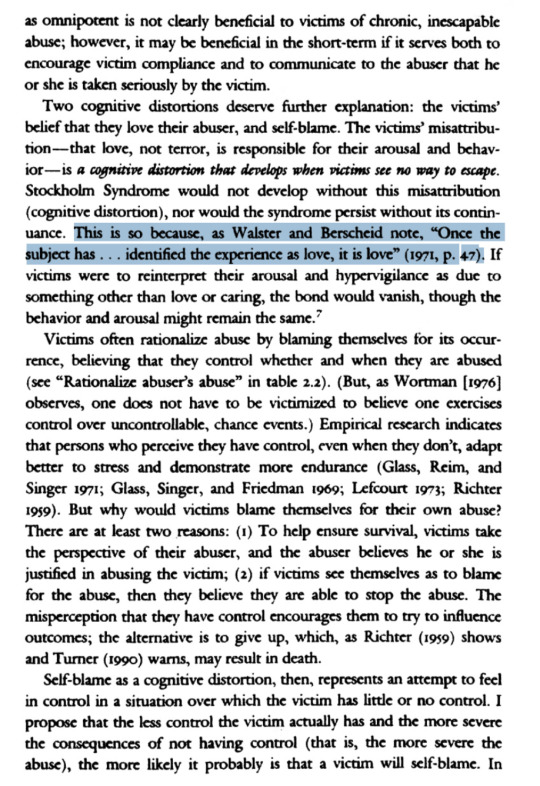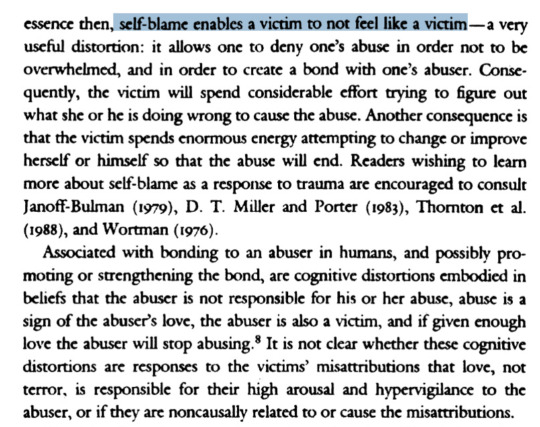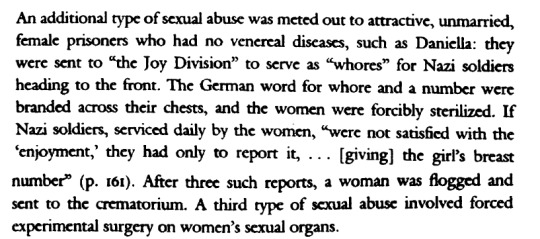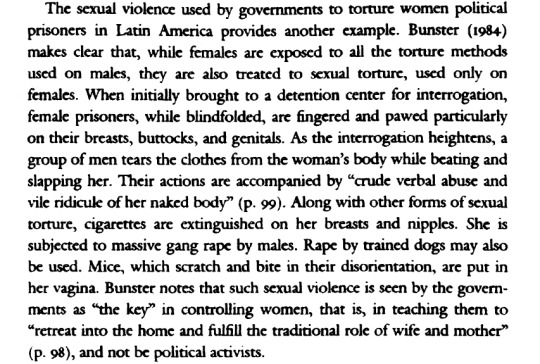#dee l.r. graham
Text




Loving to Survive: Sexual Terror, Men's Violence, and Women's Lives by Dee L.R. Graham
#dee l.r. graham#intimate partner violence#domestic violence#literature#the human custom of wrong love#trauma bonding#cognitive distortions#text#once the subject has identified the experience as love it is love#romantic love was invented to manipulate women#expiring for love is beautiful but stupid
35 notes
·
View notes
Text
Another quote from Loving to Survive by Dee L.R. Graham. I find this very relevant to the current monopolization of radical feminist spaces by the trans issue.

5 notes
·
View notes
Text
thinking deeply about that loving to survive by dee l.r. graham quote and realizing that white men will literally keep heads in their freezer and society will be like "but don't be too mean to them about it :-/"
0 notes
Text




“If the superiority of the penis over the vagina is being established through male sexual violence against females, then males benefit from this violence in their everyday interactions with females if they remind females that they, males, have a penis, and the women have a vagina. The more frequently females (and males) are reminded of this dominance of the penis over the vagina, the more rewards all men reap from some men’s sexual violence against women.”
305 notes
·
View notes
Text
The way some so called “progressists” get all riled up because you’re not supposed to read “problematic” books.... Sis, is this the Woke Index? Have some critical thinking ffs.
#the liberal left is annoying me so damn much#like what if i want to get out of my bubble and see what other people are saying?#in order to even criticize something or agree with a set or principles you also have to check OPPOSITE ideas#since when is it valid to cancel authors and readers for daring to consume content you don't agree with????#why do we endorse this shit??#if you fear books this much maybe there's something wrong with your own beliefs#and like... i'm an adult#i'm paying for my own books so why people feel it's valid to try and censor what i want to consume?#to say one is supporting a bad agenda only by checking what other people are saying... my god since when did we let our brains turn to goo?#can wait for loving to survive by dee l.r. graham to arrive so i can understand what this fuss is all about#feminism#feminist literature#feminist books
0 notes
Text
“Although men are more likely than women to be murdered, women are more likely than men to be murdered by a member of the other sex and by a spouse. MacKinnon (1987) reports that “four out of five murdered women are killed by men; between one third and one half [of murdered women] are married to their murderers. When you add in boyfriends and former spouses, the figures rise.” Dobash and Dobash (1977/78) reported finding that more than 40 percent of women who are murdered are murdered by their husbands. By comparison, only 10 percent of male murder victims are killed by their wives. Walter Gove (1973) found that “for women the shift from being single to being married increases the likelihood of being murdered, while for men the shift decreases their chances.” Gove obtained similar findings for single as compared to married women as regards “accidental deaths.” It is, of course, likely that many accidental deaths were in fact murders. Such statistics served as the impetus for Blinder’s (1985) remark, “In America, the bedroom is second only to the highway as the scene of slaughter.
Loving to Survive by Dee L.R. Graham”
547 notes
·
View notes
Quote
Men's violence creates ever-present - and therefore often unrecognized - terror in women. For instance, this terror is experienced as a fear, by ANY woman, of rape by ANY man or as a fear of making a man - ANY man - angry. We propose that women's current psychology is actually a psychology of women under conditions of captivity - that is, under conditions of terror caused by male violence against women. (In fact, the conditions of women are conditions of slavery.)...We set forth the idea that women's responses to men, and to male violence, resemble hostages' responses to captors. More specifically, we propose that a construct recognized in hostage-taking events, known as Stockholm Syndrome, wherein hostages and captors mutually bond to one another, can help us understand female psychology and male-female relations.
Loving to Survive by Dee L.R. Graham
2 notes
·
View notes
Note
Do you have any book suggestions for separatist feminists? Please and thank you for all your recent posts I'm loving them.
Yes! I have a whole list of works I want to read and articles I've saved over time.
**Disclaimer that I have not read all of these. Also keep in mind that although many works here state they are about and by lesbians, political lesbianism is rife in much of separatist and radical feminist theory**
Books
Theory & Herstory:
Separatism and Women's Community by Dana Shugar
For Lesbians Only: A Separatist Anthology by Sarah Lucia Hoagland and Julie Penelope
Eden built by Eves: The Culture of Women's Music Festivals by Bonnie J. Morris
Lesbian Nation: The Feminist Solution by Jill Johnston
Herlands by Keridwen Luis
Lesbian Land by Joyce Cheney
Loving to Survive by Dee L.R. Graham
Memoir:
Wild Mares: My Lesbian Back-to-the-Land Life by Dianna Hunter
Fiction:
Herland by Charlotte Perkins Gilman
The Female Man by Joanna Russ
Ammonite by Nicola Griffith
The Wanderground by Sally Miller Gearhart
Essays
Some Reflections on Separatism and Power by Marily Frye
Women-Only Spaces: An Alternative To Patriarchy by Jennie Ruby (couldn't find this one online)
Exploring the Value of Women-Only Space by Kya Ogyn
SCUM Manifesto by Valerie Solanas
The Combahee River Collective Statement (black women speaking against separatism, but I think it's an important read)
Dyke A Quarterly No. 6 Separatist Symposium Part One
FEMINISM FIRST: an essay on lesbian separatism
Separatism is Not a Luxury
Theorists:
Sonia Johnson:
Going Out of Our Minds: The Metaphysics of Liberation
Wildfire: Igniting the She/Volution
The Sisterwitch Conspiracy
Icemountainfire:
https://icemountainfire.wordpress.com/2014/11/17/men-are-not-broken/
Factcheckme:
https://factcheckme.wordpress.com/tag/the-sisterwitch-conspiracy/
Bev Jo (she is poliles just fyi):
https://bevjoradicallesbian.wordpress.com/2017/09/05/chapterfivelesbians-for-lesbians-dyke-separatism/#more-672
Articles:
https://www.newyorker.com/magazine/2009/03/02/lesbian-nation
https://modernfarmer.com/2015/01/women-farming/
https://www.vice.com/en_us/article/xye9k3/no-mans-land-how-to-build-a-feminist-utopia
330 notes
·
View notes
Text
“Suddenly there are footsteps behind her. Heavy, rapid. A man’s footsteps… . She quickens her pace in time to the quickening of her pulse. She is afraid. He could be a rapist. He could be a soldier, a harasser, a robber, a killer. He could be none of these. He could be a man in a hurry. He could be a man merely walking at his normal pace. But she fears him. She fears him because he is a man. She does not feel the same way—on city street or dirt road, in parking lot or field— if she hears a woman’s footsteps behind her. It is the footsteps of a man she fears. This moment she shares with every human being who is female.” - Robin Morgan
“When we describe this experience in our Women’s Studies classes and explain that every woman has gone through it, the men in the class are incredulous. Invariably, one man will ask the women students, in a disbelieving tone, how many of them have really experienced this fear. The women, equally shocked that a man wouldn’t know they do experience it, respond with statements such as, “You’ve got to be kidding!” This dialogue strikingly exposes the extent to which fear is ever present in women’s—but not men’s—lives. It dramatically exposes what it means to be male—as opposed to female—in patriarchal culture. It dramatically reveals the extent to which fear and lack of fear can be taken for granted.” - Dee L.R. Graham, Loving to survive
211 notes
·
View notes
Text

Translation: “Constantly seeing women say they won’t have sex with men is like...so damaging to men”
“Because men want women’s sexual services for themselves only, seeing female-female sexuality as taking something from them, men make women’s heterosexuality compulsory [...] and compulsory heterosexuality for women means more than that women should simply have sex with men rather than with women. It means also that women should have sex with men no matter how badly we have been treated by men. Consider, for example, the rape victim who is pressured to “return” to men sexually and affectionally through such remarks as “Are you angry at all men now?” with the implication that being angry at men as a group, or at any man other than the rapist, is not acceptable. Consider also the many ways it is communicated to women that we must have sex with our husbands, whether by priests, sex therapists, the family doctor, or one’s own mother. Choosing to give up sex with men or to withdraw from men because men are physically violent toward women is not considered a legitimate option for women. Imagine the responses you would get if you told others you were giving up sex with men or disengaging from men because men are violent toward women. Choosing to withdraw from men simply because men do not relate to us in mutually empowering ways is treated as heresy. Recall from chapter 3 that, as court trials involving allegations of rape demonstrate, it is often difficult for people to discriminate rape from sex. And women and men frequently view sex and rape differently. More specifically, men often see sex where women see rape.”— Loving to Survive by Dee L.R. Graham
@mascbi
30 notes
·
View notes
Link
1 note
·
View note
Text
Dee L.R. Graham describes patriarchal reversal in Loving to Survive.

0 notes
Text
Book questions (although, more aptly, literature questions because I listed poetry, articles etc… too)
Tagged by @wynsalls too long ago (apologies).
1. Who is your favourite author - from your country! / mothertongue
Hannah Kent (Burial Rites) and Markus Zusak (The Book Thief) are the first Australian authors to spring to mind. But there are some authors, Marcus Clarke, William Gosse Hay, Barbara Baynton, Christine Stead, Kenneth Cook, Joan Lindsay, so on, so forth… who helped establish the Australian Gothic narrative: tales of colonialism, human horror, displacement, deracination; the malevolence of the landscape–vast openness, paradoxically claustrophobic; the familiar transposed into unfamiliar, cultural unease. I’m very interested in them.
2. Your favourite children’s book (it’s hard, I know)
I spoke about something similar here: my reading history.
3. A book works that (have) changed your life?
The Lady of Shalott, Alfred, Lord Tennyson: introduced to me by an impassioned English teacher in my fifth year of school–her words had a fire to them, and they ignited my interest in poetry.
Macbeth, Shakespeare: again, an introductory text–my first Shakespeare, and my favourite to this day. One’s first Shakespeare is always a life changing experience.
Perfume, Patrick Süskind: unnervingly descriptive–strikes philosophical, religious and morbid chords (the latter of which especially satisfied my tastes). Flavoured by a hungry, somewhat sinister curiosity. Orgastically olfactory.
The Bloody Chamber, Angela Carter: a collection of short stories, all primal and sensual and blood-splattered, soaked in prose with a decidedly anti-patriarchal slant. This was the work that incited both my female narrative tag and my current (amorphous) understanding, because women are dangerous and mercurial and divine and I wanted to celebrate that.
4. The best book materials you read this year?
Prevalent texts for the current times:
War Talk, Arundhati Roy
Loving To Survive: Sexual Terror, Men’s Violence, and Women’s Lives, Dee L.R. Graham (pdf)
Pedagogy of the Oppressed, Paulo Freire (pdf)
The Monstrous-Feminine: Film, Feminism, Psychoanalysis, Barbara Creed
Small, quick reads:
Candor, Anne Carson
(Excerpt of) Brief Interviews with Hideous Men, David Foster Wallace
General non-fiction:
The Faraway Nearby, Rebecca Solnit
The Surgeon of Crowthorne, Simon Winchester
Fictions:
The Bakkhai, Anne Carson
The Beast Within, Émile Zola (now, for a disclaimer/warning: this book gives the nastiest of 19th century misogynists a run for their money, and, as such, I debated over listing it here for a good half hour: there’s spousal abuse, molestation, bitter jealousy, violent death ladled on top of violent death and still more potentially triggering material–unapologetically abhorrent/disgusting. I only recommend it if you are interested in tales of corruption as unwrapped in Zola’s characteristically sharp, oil-dark prose, of which I am truly a fan)
5. And the worst book you read this year?
The Asylum, Patrick McGrath. It wasn’t awful, but the protagonist, Stella, was obnoxiously naive (nay, stupid) at times. That became grating after a while.
6. Which book is totally overrated?
I may be surrendering to a crucifixion for saying this, but The Catcher in the Rye is epidemically overrated. Also, the popularity of any of the Beat poets’ self-masturbatory works confound me… lookin’ at you, Ginsberg and Kerouac.
7. Randomly recommend a book. For whatever reason!
Incubation: A Space for Monsters, Bhanu Kapil, for every reason.
I tag: @starmaps, @antigonick, @xshayarsha, @mythofdevotion, @soracities, @wolvenry, @morgoths, @conceptvals, @la-femme-terrible, @oyae, and @075k
29 notes
·
View notes
Text



Since the topic of witchcraft came up recently, just thought I’d leave this here, from Dee Graham’s book Loving to Survive: Sexual Terror, Men’s Violence, Women’s Lives
57 notes
·
View notes
Note
Do you remember books you recommended in this blog? i've made a list of books i wanted to read from your blog such as "Men who Hate Women & the Women who Love Them" but i've lost the list and i haven't downloaded the books yet :( (btw your blog is amazing and i'm so glad i found this place that expresses and explains why I distrust men so much,suspicions that i've never succeeded putting into words, thank you
My top picks would be:
Why Does He Do That by Lundy BancroftThe Gift of Fear by Gavin de BeckerLoving to Survive by Dee L.R. GrahamShould I Stay or Should I Go by Lundy Bancroft and JAC Patrissi (for during a relationship)It’s My Life Now by Meg Kennedy Dugan and Roger Hock (for after a relationship)Trauma and Recovery by Judith HermanThe Verbally Abusive Relationship by Patricia Evans
83 notes
·
View notes
Quote
Because men want women’s sexual services for themselves only, seeing female-female sexuality as taking something from them, men make women’s heterosexuality compulsory. As a result, females view male sexual partners as “good” and female sexual partners as “bad” *for women*. But compulsory heterosexuality for women means more than that women should simply have sex with men rather than with women.
It means also that women should have sex with men no matter how badly we have been treated by men. Consider, for example, the rape victim who is pressured to “return” to men sexually and affectionately through such remarks as “Are you angry at all men now?” with the implication that being angry at men as a group, or at any man other than the rapist, is not acceptable.
Consider also the many ways it is communicated to women that we must have sex with our husbands, whether by priests, sex therapists, the family doctor, or one’s own mother. Choosing to give up sex with men or to withdraw from men *because men are physically violent toward women* is not considered a legitimate option for women. Imagine the responses you would get if you told others you were giving up sex with men or disengaging from men because men are violent toward women.
Choosing to withdraw from men simply because men do not relate to us in mutually empowering ways is treated as heresy.
Dee L.R. Graham with Roberta K. Rigsby & Edna I. Rawlings (1995), Loving to Survive
3 notes
·
View notes